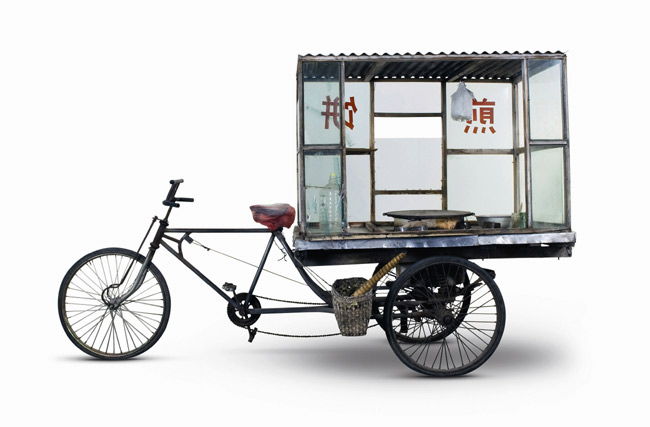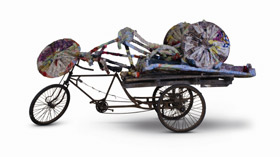The project CHINETIK has picked nineteen Chinese street bicycles and shows them unaltered, with their original wares – coal, cooking pots, litter, etc., as sculptural works in a different cultural context. These authentic articles of daily use thus acquire the basic characteristics of objets trouvés, though with the difference that they are not integrated into an artwork but themselves become independent works of art.
Changes at a frenetic pace
When talking about China’s development from an agrarian society into a global economic power, figures usually are more expressive than words. After the long period of self-imposed isolation, more than 400 million human beings today in the Middle Kingdom communicate by cell phones – when, barely ten years ago, the majority of 1.3 billion Chinese only knew of the telephone by hearsay. 1300 new cars are registered daily in Beijing, 2 million motorised vehicles congest the streets of the capital every day, changing the cityscape and the quality of its air. Within ten years, according to conservative estimates, 130 million cars will be driving on China’s roads. There are still 540 million bicycles in China, the former nation of cyclists. At some time in the near future, cars will gain the upper hand over cyclists on roads in China. The realities of daily life in China are changing at a frenetic pace, with a loss each new day to ordinary Chinese culture.
The end of bicycles?
The pace of change is too rapid to keep up with it by bicycle. Barely thirty years ago, the bicycle embodied the progress from the relative static ox driven cart toward greater mobility and, in a small measure, toward the freedom afforded by increased mobility. In the 1970s, the bicycle was a status symbol in Chinese society. In order to obtain a bicycle, one had to have a coupon, and coupons were distributed by draws. Moreover, the owner of a bicycle had the opportunity to engage in trade and commerce. Tricycles served as mobile kitchens, for the transport of coal, as repair shops, stores or for the removal of refuse. Served – since bicycles and the culture surrounding them are disappearing from the urban scene in larger Chinese cities such as Beijing or Shanghai. One does still see them, but not in great numbers, and bicycles now bear the stigma of a passing era. They are becoming symbols of change, museum objects, a retrospective on wheels.
Bicycles as works of art
The misappropriation of the bicycle causes tension and a frictional interface that becomes a metaphor and stands for change. Against the backdrop of frenetic modernisation CHINETIK is a meaningful artefact, a vehicle for change and contrast. CHINETIK creates its own object language that is not the language of the marketplace. In the western world, on the contrary, industrialised nations are intensifying their search for alternative forms of energy. For the exhibition, 14 artists (Guillaume Bijl, Daniele Buetti, Franz Burkhardt, Stephen Craig, Gao Lei, Peter Knapp, Job Koelewijn, Peter Kogler, Mu Bo Yan, Robert Rauschenberg, Ulrike Schröter, Michael Vessa, Thomas Virnich, Xiao Yu) have been commissioned to re-think “Chinese” bicycles that are exhibited alongside the original ones. Through this transformation, the bicycles are disconnected from their real function and find their way into modernity.
Illustration: Thomas Virnich (*1957, De), Vehicle in its flowery silk corsage, 2008 / 2009
PUBLICATION:
An accompanying publication is to appear in March 2009 at Reinhardt Verlag Basel.
To see more illustrations, click on VERSION FRANCAISE at the top of this page
| 








